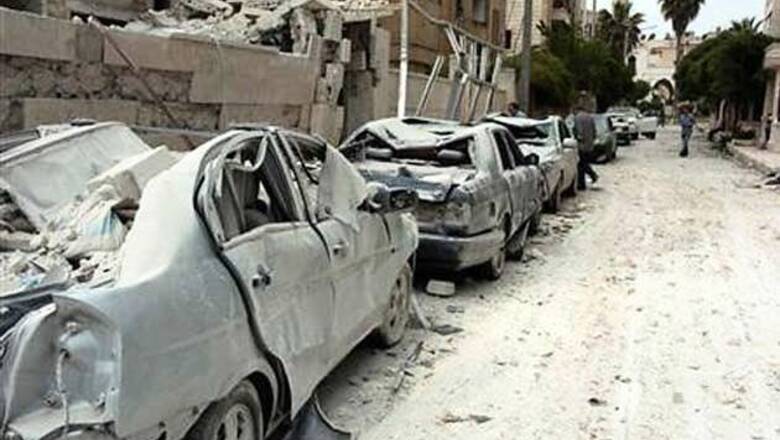
views
Beirut: Explosions blew the fronts off buildings in the Syrian town of Idlib on Monday, with state TV reporting nine people killed and 100 wounded including security services personnel targeted by an intensifying rebel bombing campaign.
Images on state television showed flattened cars and mangled bodies lying under tarpaulins near the site of a pair of bombings. Craters had been blasted in the road.
"My wife and I were asleep in bed and then there was a loud explosion. It rocked the whole house and woke us all up," said one man, standing amid rubble.
"Is this the freedom they want? How can it be the fault of children? How can the innocents be to blame?"
There was no immediate claim of responsibility.
One of the main militia fighting to topple President Bashar al-Assad, the Free Syrian Army, denied blame. However, fighters say they are shifting tactics towards homemade bombs to even the odds between their outgunned forces and his powerful army.
Assad's government says such blasts are the work of terrorists and prove that his opponents are ignoring a UN ceasefire.
State TV said United Nations monitors overseeing the 18-day-old ceasefire were visiting the scene while their commander, Norwegian general Robert Mood, was being briefed on "violations by the armed opposition".
The state television broadcast blamed the explosions on suicide bombers, although it also showed a woman who said one of the bombs had been planted by men who ran away.
An opposition activist at the UK-based Syrian Observatory of Human Rights (SOHR) said the two blasts appeared to target the local headquarters of the intelligence services for the air force and army, two of the many security agencies that have helped keep the Assad family in power for four decades.
The activist put the death toll at over 20. He also reported casualties from a third blast in Idlib several hours later, although he gave no further details. Syria bars most independent journalists, making it difficult to verify details.
Ceasefire
The United Nations says security forces have killed 9,000 people in the uprising, which started as peaceful mass protests inspired by rebellions elsewhere in the Arab world but which is becoming an increasingly bloody guerrilla insurgency.
Damascus says rebels have killed 2,600 members of its forces and has accused the United Nations of turning a blind eye to "terrorist acts" committed by those fighting for the removal of Assad, who succeeded his late father, Hafez al-Assad, in 2000.
Although the rebels are far from a unitary force, their tactics appear to be shifting from small-scale ambushes on checkpoints and military patrols to audacious assaults on infrastructure and symbols of the Assad state.
"The rebels are getting better at bomb-making - as you know, desperation is the mother of invention," one anti-Assad fighter who claimed to be in command of a militia unit told Reuters in neighbouring Lebanon. "We are starting to get smarter."
On Saturday, gunmen in inflatable dinghies killed several people in a seaborne assault on a military unit near the port of Latakia, and militants fired rocket-propelled grenades at the central bank in Damascus on Sunday, causing slight damage.
An Islamist group calling itself al-Nusra Front has claimed responsibility for a suicide bombing that killed at least nine people, most of them security officials, in Damascus on Friday.
Also on Friday, authorities in Beirut seized a ship carrying a large consignment of weapons from Libya, including rocket-propelled grenades and heavy calibre ammunition, that could have been smuggled into Syria.
Syrian soldiers fired at a group of four skiers along the mountainous border on Monday after they mistook them for smugglers, Lebanese security sources said. One Lebanese skier was wounded.
"Huge task"
UN truce monitors are trickling in to Syria, with 30 of a planned 300 now on the ground. Their commander, Major General Mood, a veteran of previous Middle East peace bids, acknowledged the huge task awaiting him but said progress was possible.
"We will be only 300 but we can make a difference," he told reporters on his arrival in Damascus. "Thirty unarmed observers, 300 unarmed observers, even 1,000 unarmed observers cannot solve all the problems," he said.
Underscoring the challenges of covering a nation of 23 million people, the SOHR activist said two people were killed by security forces in separate incidents in the provinces on Monday.
However, activists in the restive central city of Homs say violence has dropped sharply since the observers deployed a permanent two-man team there last week.
"There are still violations but the shelling and mortar fire has stopped," Karam Abu Rabea said. "We have insisted that the observers stay in Homs because we know if they leave (the attacks) will continue."
Despite the relative calm in Homs, activists said at last 39 people were killed across the country on Sunday, including civilians, security forces and rebels.




















Comments
0 comment